Senamile Ndwandwe carrying Wendy Ndebele's daughter
As you approach the back of the hostel building from Richard Baloyi Street (formerly Hofmeyer Street) in Alexandra, Johannesburg, you are ambushed by hundreds of corrugated shacks clinging on to each other.
Among them is a narrow “double up”, a short cut that goes all the way to Fourth Avenue. If you take this, you are met by the mammoth structure.
The left side of the building has a huge arched gate that resembles the entrance of an old medieval castle, the bottom of which is immersed in stagnant sewage that has soaked into the garbage.
The stench is nauseating but, if you look up, the windows above this mess are wide open and you can hear Rihanna’s sultry voice wafting out of one: “We’re beautiful like diamonds in the sky/ Shine bright like a diamond.”
A short ramp leads to the gate at the front of the building. Welcome to the Helen Joseph Women’s Hostel.
If you’re a woman entering the hostel, the two security guards — in their white shirts, maroon trousers with black trim and scuffed black school-style shoes — don’t give you a second glance but, if you’re a man, you’re asked a million questions — why you’re there, who are you there to see …
The hostel is a brick monolith built in the shape of a diamond, with eight blocks (A to G) that each have five floors. It was built by the apartheid government in 1972 as a way to control the movements of the black migrant labour force. Its architecture reminds you of a fortress.
The government decided to build 25 single-sex hostels in Alexandra, which would house 2 500 workers each. In the end, only three were built: Helen Joseph Women’s Hostel, Madala Hostel (in 1971) and Nobuhle Hostel (in 1972).
Although the Helen Joseph Women’s Hostel is a very real legacy of apartheid, the past few years have introduced a change in the age of the women living there, with many younger women, born after the advent of democracy in 1994, making it their home.
When you enter the huge courtyard, you are met by the laughter of the many young women sitting on Black Label beer crates and plastic chairs, braiding each other’s hair. On dozens of washing lines hang skinny jeans, miniskirts, crop tops, summer dresses and torn jeans. Running between the clothes are little children playing a game of black mampatile (hide and seek).
Nokwanda Ndebele (19) has been living in the hostel with her sister since March 2017. She was born in KwaCeza village in KwaZulu-Natal, where she lived with her grandmother until she moved to Alex when she was two years old.
During apartheid, Alex was on the outskirts of several “white” areas and women (mostly domestic workers) were allowed to live in the hostel, from where they would commute to work and raise other people’s children while their own were back home being raised by grandmothers and other relatives.
This pattern is still familiar but more women are living with their children in the hostels, creating something of a family atmosphere.
“My mom lived in this hostel with three other women when I was young. When I moved to Jo’burg, I lived with her here in the hostel until I was six but then I moved to Germiston to go live with my dad. I did my matric in 2016 and then came back to live here,” said Nokwanda.
When her mother lived in the hostel, she shared the room with three other women whom she didn’t know.
“You see those numbers painted on the wall? They were used to identify whose bed is where and each bed had a locker next to it for clothes and other stuff,” Nokwanda says as she points to a fading number painted on the wall above her bed.
“Each room also had a locker in the kitchen for storage of pots and other dishes. We still use that locker now.”
Two of the women Nokwanda’s mother lived with have moved out of the hostel and the third has died. Nokwanda’s mother also moved out to live in another part of Alex with her partner, and her daughters took over her room.
The hostel is home to more than 3 000 women and children, and the hope is that it will be turned into family units instead of single-sex housing, as at Nobuhle Hostel.
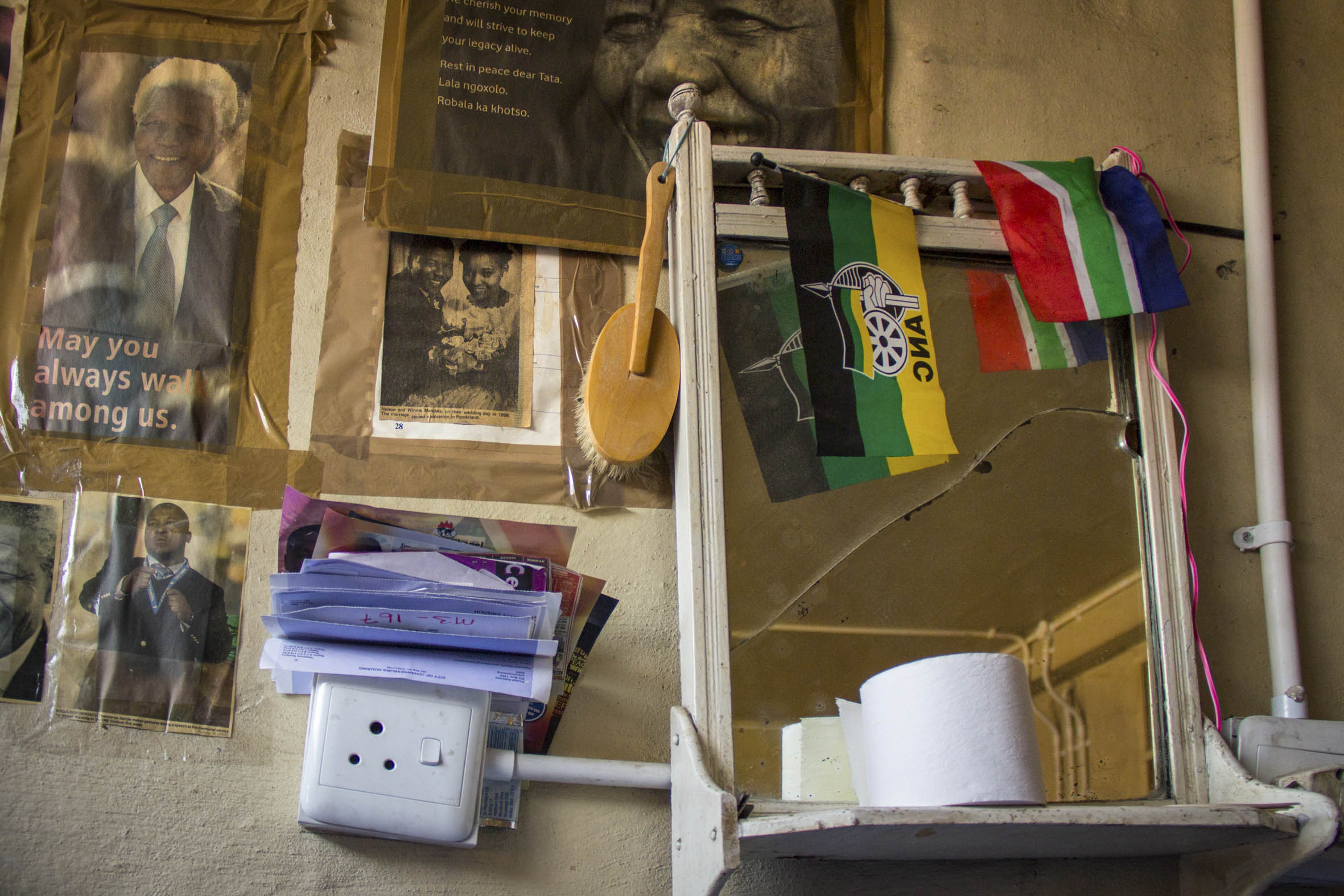
[(Lizzy Muholi)]
Nokwanda claps and sits up on the couch. “Living with other young women is nice but there is also so much drama, let me tell you! There is competition among the girls here about what you wear, who you’re dating, what car the person you’re dating drives, what phone you have, your hairstyle. People even steal your clothes when they are on the washing line. Yho, there’s drama here.”
Nokwanda shares the room with her sister Wendy Ndebele (22), who also lived with their father in Germiston until she moved to the hostel in November 2016.
“I moved from Leondale to come live here with my mom when I fell pregnant. I was scared of my dad after falling pregnant so that’s why I came to stay here.”
Wendy is the more reserved of the two sisters but she gradually joins in the conversation and explains how the hostel works and describes the relationship between the older generation of women who have been in the hostel for a long time and the new generation of young women moving in.
She picks up her eight-month-old baby, Melokuhle, from the bed and adjusts some of her tiny ponytails that have come undone.
“We have what we call block ladies for each block of the hostel. This person’s responsibility is to discipline the people living on their block when they misbehave and, when you have any issues, then you go to her. The problem, though, is our block lady is old and mean, so she doesn’t care.
“She hardly attends meetings and doesn’t greet you when she sees you in the passage. She also doesn’t want children to play in the passages and kitchen. She kicks them out and tells them that they’re making a noise.”
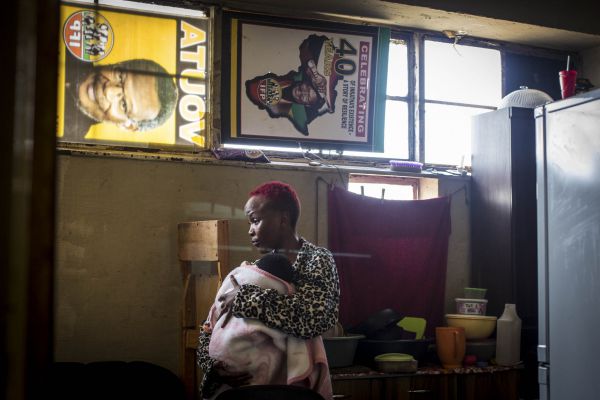 [(Lizzy Muholi)]
[(Lizzy Muholi)]
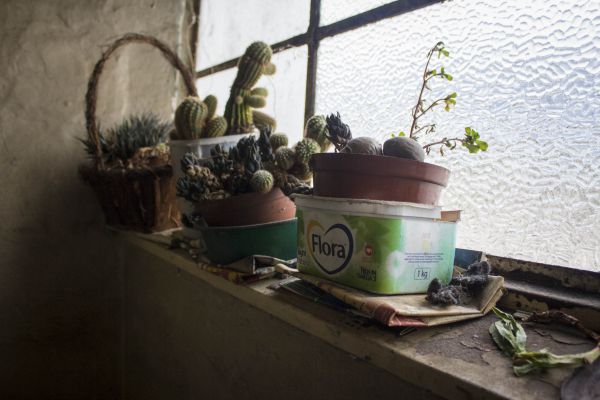 [(Lizzy Muholi)]
[(Lizzy Muholi)]
Nokwanda, who has been playing with the piercing under her lip, adds: “Our block lady can’t even go to the floors upstairs because she’s old and can’t climb the stairs.
“There is tension between the older women and the younger women here in the hostel. We don’t get along. We young ones go to parties at night and, when we come back, we come back ratchet and loud. In the mornings, you’ll hear the older women saying, ‘They are being loud, they must go’. Then we respond with ‘You should go and move to the rural areas because you’re old’. When we say it’s our time now, they say we young ones must go because this is their place.”
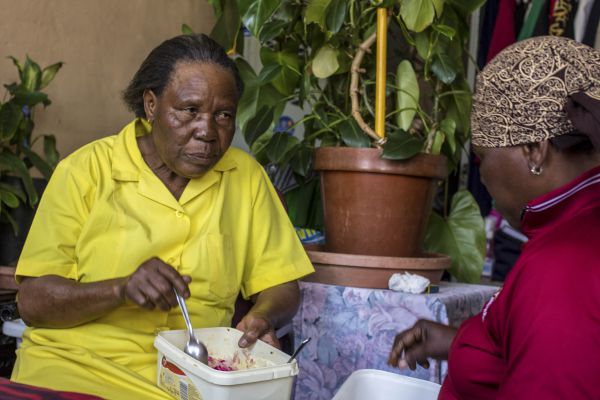
[Generations: Women born after 1994 follow the older generation like Mam’ Lidia (in yellow) and Shiela Ntsinde (in a black hat) to the hostels (above). Each room has a locker in the kitchen (below). (Lizzy Muholi)]
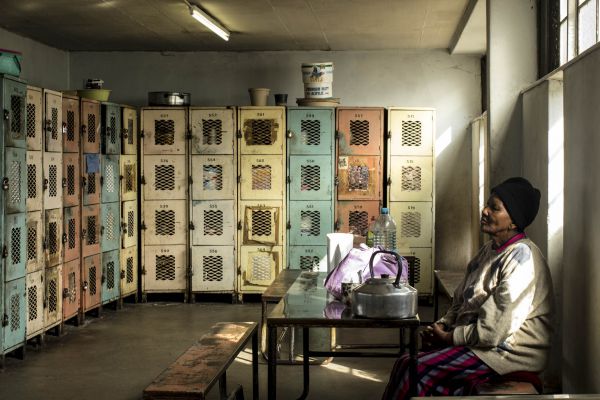
Senamile Ndwandwe (22) was born in KwaNongoma in KwaZulu-Natal and she started living with her older sister in the hostel in 2013. She is related to Wendy and Nokwanda.
“The hostel is slowly being turned into family units or individual rooms instead of just having many women who don’t know each other sharing one room. So let’s say someone leaves the hostel, dies or moves to another room, then another person who is sharing will be moved into the empty room. A lot of older women leave the hostel because they’re retiring to the rural areas and then they’ll call a younger woman [relative] to live in their space. That’s why there is a change in the ages of the women living in the hostel.”
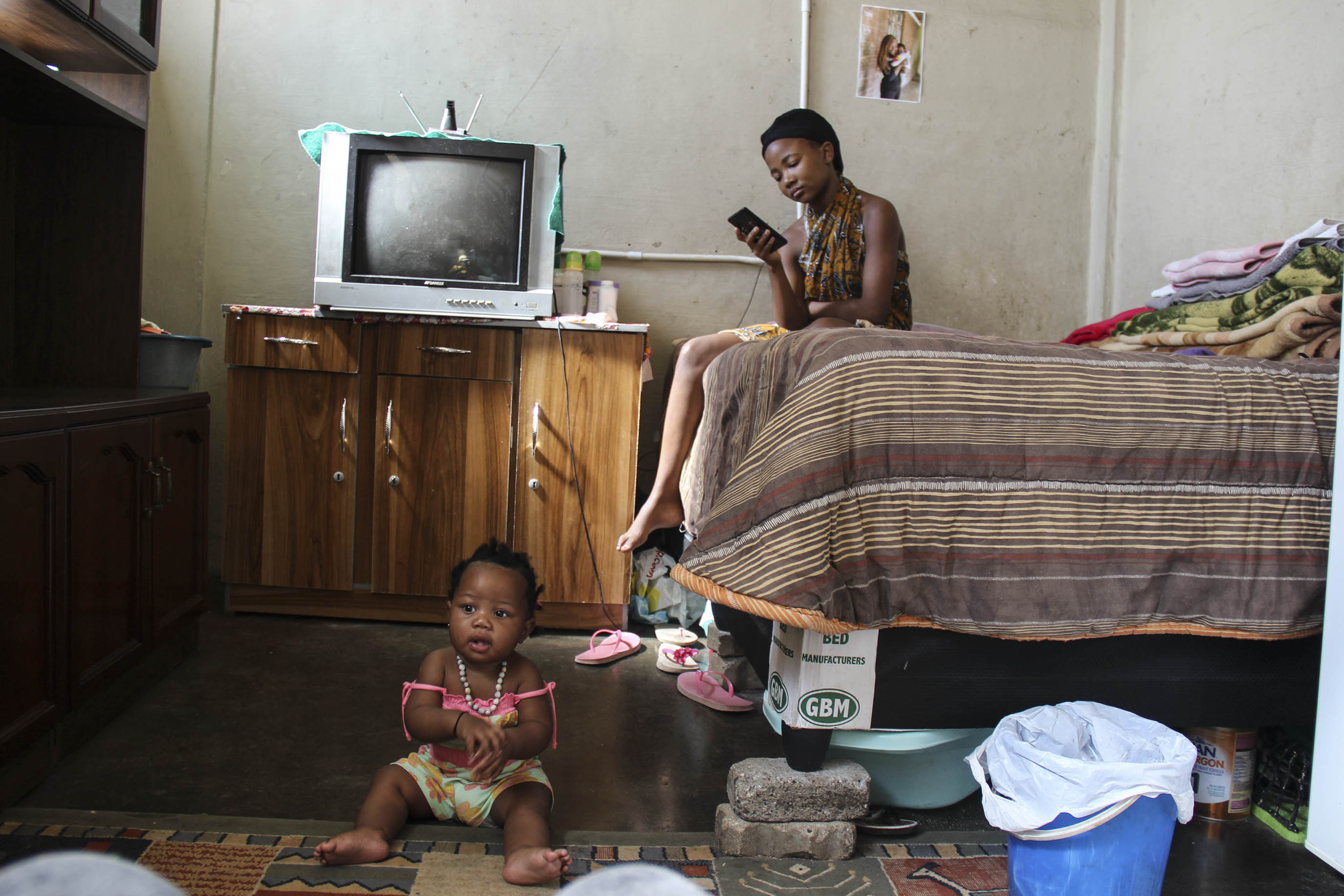
[(Lizzy Muholi)]
Nokwanda, Wendy and Senamile start talking over each other to share the difficulties they face.
Nokwanda’s voice rings out: “Living here in the hostel is horrible because we have a problem with sanitation. Even now, we share toilets and some people are not clean. We have water but sometimes it’s just switched off with no warning. Living with so many people is horrible because it’s unhygienic. Some people leave their rooms with a bucket full of urine and just pour it down the kitchen sink. Cabanga nje [Just imagine]!”
“But the water is better this year than it was last year. They have even put in Jojo tanks. Most of the pipes are too old and damaged to provide water properly,” adds Senamile, who is interrupted by Nokwanda with a loud “Hai! There are no pipe issues here, they just switch off the water on purpose, maan!”
Wendy waits for the laughter to die down before explaining that each floor has five or six toilets. Each toilet is shared by three rooms and it is kept locked.
Most of the hostel’s windows are broken and boarded up with cardboard. The waste water and sewage leaking from the many broken pipes has turned parts of the grassed areas into swamps, which means that children can’t play outside.
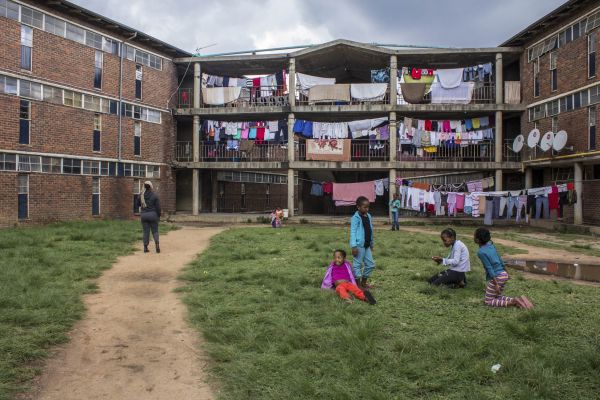
[Children living in the hostels play in the yard but their mothers worry about broken sewerage systems (Lizzy Muholi)]
Nokwanda says, although they pay rent (between R70 to R100 a month), they don’t see the point of this — and many people don’t pay it at all.
“We don’t see the benefits of paying rent. They just eat the money because nothing is improving. Most of the windows are broken and they’re not fixing them. It has been years. If you look out our window, you’ll see that there is a roof at the top of that other block that was damaged by strong winds a while back. When it rains, the rooms in there get flooded and all those people’s things are soaked.”
Besides the daily problems, the women’s hostel is infamous for being a place where babies are found wrapped in plastic bags.
Nokwanda bends her head and looks at her hands. “Many babies are found thrown away or aborted. You can’t be sure if it’s only women from the hostel doing this because any woman can just walk in here with a plastic bag and dump it. It happens a lot and there are so many young women who fall pregnant here. Who are you going to blame? Some babies are found in drains. Living here is painful. So painful.”
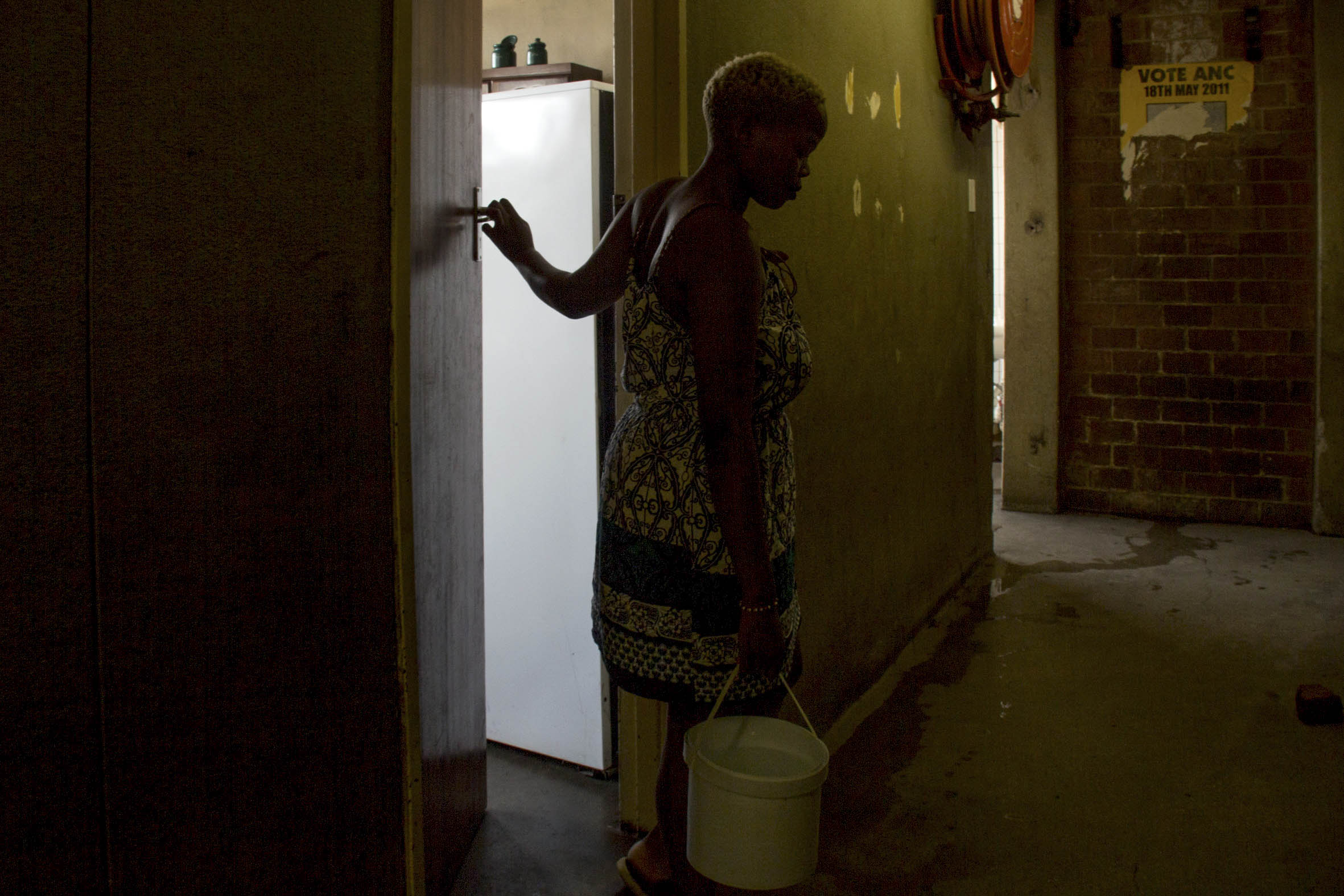
[Nokwanda Ndebele. (Lizzy Muholi)]
The apartheid government’s intention to subject black people to subhuman living conditions that offered no way of getting out or progressing continues to haunt the hostel.
“There are so many problems here at the hostel. The piping has issues, so sometimes sewage and water just pools outside in the yards and stays there for a long time. The smell — don’t get me started.
“We understand that the goal is to get the hostel into family units but the young men who live here with their mothers don’t make us feel safe. Sometimes they just grab and run off with your bag while you’re walking up the stairs at night.
“The only thing that is a comfort to us is that, if a man comes into your room to attack you, you can blow a whistle and scream ‘indoda!’ [man] and the other women will come out to help you,” Nokwanda says.
The three women are also quick to share their dreams.
Senamile takes acting classes at Olive Tree Theatre in Alex every day from about 7am until late in the afternoon. She says acting is what she was “born to do” but she’s very clear about what she wants.
“I don’t like on-screen acting. I like theatre more. My dream is to go international and perform in other countries, so I’ll keep going to these classes until I get where I want to.”
Wendy was doing her second year in public relations at Rosebank College when she fell pregnant. She works at a retail store in Woodmead. Nokwanda looks after her daughter during the week when she’s at work.
“Studying public relations is not what I wanted to do exactly. I wanted to study social work. When I went to UJ [University of Johannesburg] to apply for social work, it was already full because I applied late. I didn’t want to just sit at home and do nothing so that’s how I ended up doing public relations … One day when I’m done with my diploma and I’m working, I’m going to start studying social work,” Wendy says as she ties up her long braids with a print scarf.
Nokwanda wants to teach consumer studies, business and tourism.
“I have the passion of teaching and I can sit down with someone and explain something to them until they understand. I want to go back home to the rural areas and teach there because I feel like schools back home lack teachers who are qualified and passionate and knowledgeable, and I want to be that.”
But these young women can never stay serious for long. Senamile dramatically pops the gum she has been chewing, much to Nokwanda’s irritation, and Wendy starts laughing. Before you know it, they’re laughing and arguing about where the best chilling spots in Alex are.